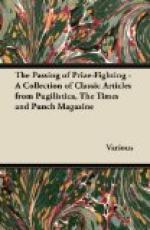The subject of political economy is becoming so general a portion of education, that it will doubtless soon be introduced at the infant schools among the other eccentric evolutions or playful whirls of Mr. Wilder-spin. At it is the fashion to comprehend nothing, but to have a smattering of everything, we beg leave to smatter our readers with a very thin layer of political economy. In the first place, “political” means “political,” and “economy” signifies “economy,” at least when taken separately; but put them together, and they express all kinds of extravagance. Political economy contemplates the possibility of labouring without work, eating without food, and living without the means of subsistence. Social, or individual economy, teaches to live within our means; political economy calls upon us to live without them. In the debates, when more than usual time has been wasted in talking the most extravagant stuff, ten to one that there has been a good deal of political economy. If you bother a poor devil who is dying of want, and speak to him about consumption, it is probably “political economy” that you will have addressed to him. If you talk to a man sinking with hunger about floating capital, you will no doubt have given him the benefit of a few hints in “political economy:” while, if to a wretch in tattered rags you broach the theory of rent, he must be an ungrateful beast indeed if he does not appreciate the blessings of “political economy.” That “labour is wealth” forms one of the most refreshing axioms of this delicious science; and if brought to the notice of a man breaking stones on the road, he would perhaps wonder where his wealth might be while thinking of his labour, but he could not question your proficiency in “political economy.” In fact, it is the most political and most economical science in the world, if it can only be made to achieve its object, which is to persuade the hard-working classes that they are the richest people in the universe, for their labour gives value, and value gives wealth; but who gets the value and the wealth is a consideration that does not fall within the province of “political economy.”
There is another branch of the subject at which we shall merely glance; but one hint will open up a wide field of observation to the student. The branch to which we allude is the tremendous extent to which political economy is carried by those who interfere so much in politics with so very little political knowledge, and who consequently display a most surprising share of “political economy,”
As a very little goes a great way, and particularly as the most diminutive portion of knowledge communicated by ourselves is, like the “one small pill constituting a dose,” much more efficacious than the 40 Number Ones and 50 Number Twos of the mere quacks, we close for the present our observations on Political Economy.
* * * * *




